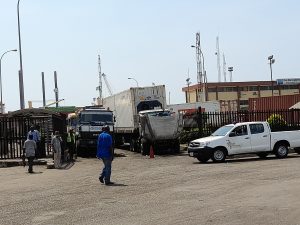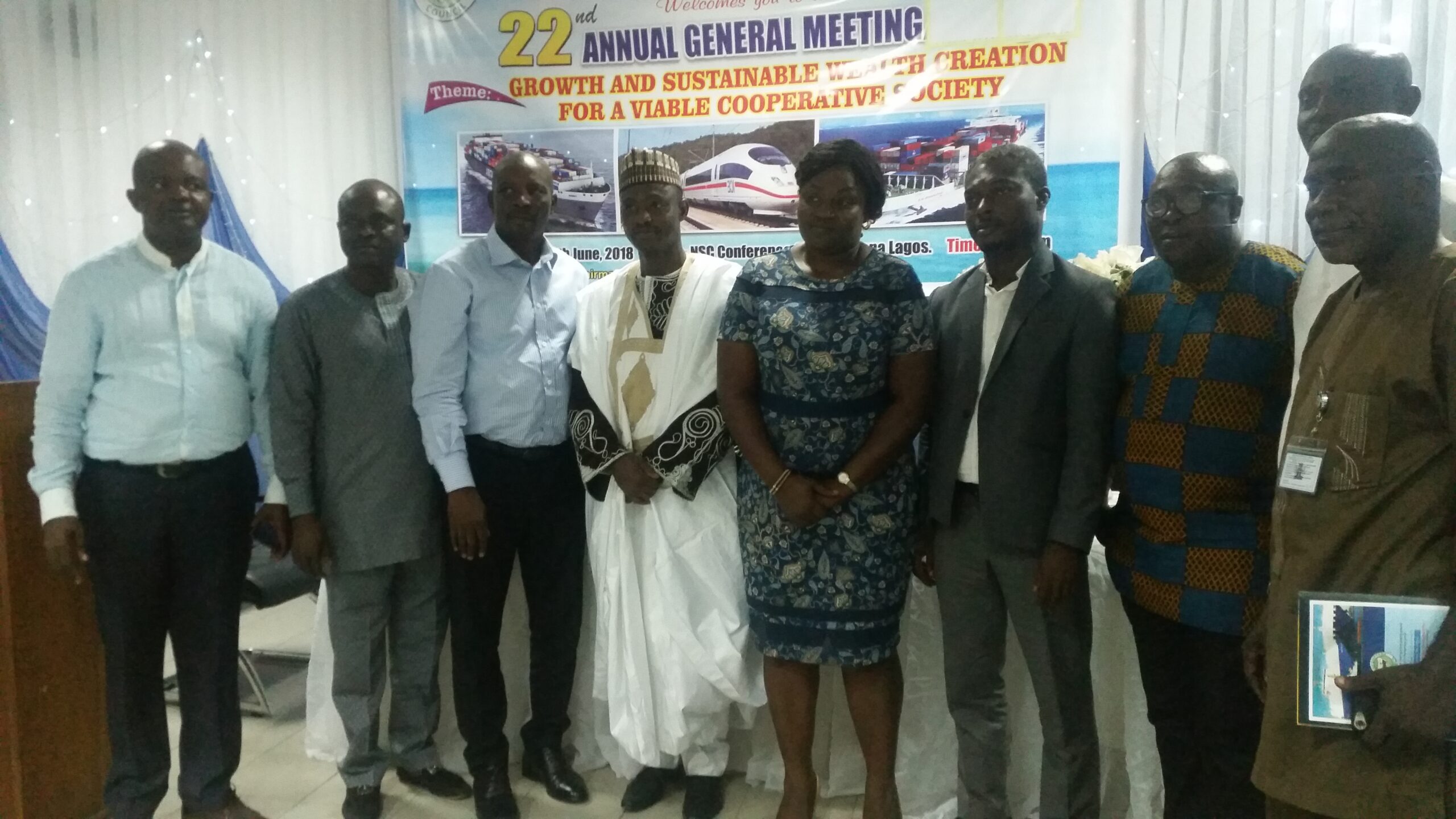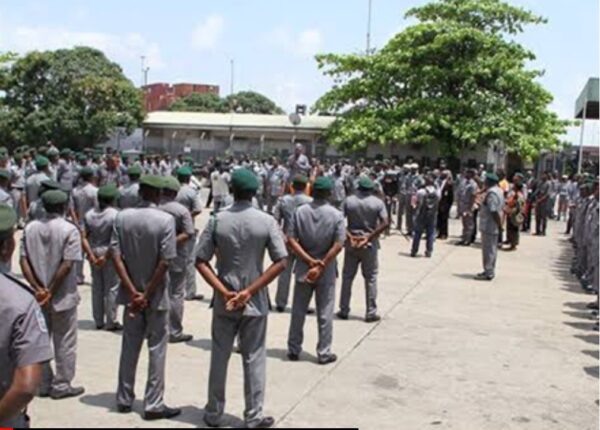Demystifying Tin Can Island Port Access Crisis

By Kenneth Jukpor
The Tin Can Island Port environment is fraught with numerous challenges which have heightened in the last few weeks. This port also has a unique feature of receiving bulk goods mostly in groupage and this distinction has become an added peril in its operations.
As a result of the complexities on the port access roads and the dreaded interception by Customs units on the highways like the Federal Operations Units (FOU), most importers utilizing the Tin Can Island Port opt to strip their cargoes before leaving the port environment.
While cargo stripping isn’t the norm in port business globally, and particularly hazardous as it clogs the port access roads, Nigerian Ports Authority (NPA) has caved in to allow this practice that has created anarchy at the ports.
MMS Plus observed during the week that trucks laden with cargoes cleared at several terminals in the Tin Can Island Port were unwilling to leave the port environment as they dillydallied until dusk to enable stripping of the containers.
Most importers have resorted to stripping at Tin Can to evade possible seizures by Customs and enable them to easily evacuate the goods and the high demand for stripping at the port environment has made the service more expensive than conveying the goods outside the ports.
Despite the N600,000 to N700,000 charged for stripping, on Tuesday last week, over 120 trucks were ready to go into stripping but the stripping yards were filled up, resulting in more traffic gridlocks as trucks hung around waiting for an opportunity to strip.
Consequently, other cleared imports were unable to leave the port while exports couldn’t also access the port.
According to a top NPA source, this logistics quagmire was what led the Authority to suspend stripping within the Tin Can Island Port premises.
Truckers, however, found this new policy unpalatable as they had earlier collected monies for stripping instead of heading out of the ports. Therefore, they demanded renegotiation for additional fees to leave the port environment which is a hotspot for truckers in search of businesses.
Agents, on the other hand, argued that the stripping fares ranging between N600,000 to N700,000 was sufficient to move the cargoes outside the port environment.
“The amount for stripping in the Tin Can Island port area is exorbitant but it is simply a factor determined by market forces. The demand for stripping in this area is so high and there is no space for such activity. Therefore, those with the facility hiked the prices but importers don’t care because it saves them from the possible dangers with the multiple Customs units on the highways,” an NPA official at Tin Can Island Port said.
Noting that stripping isn’t the ideal practice around the world, the NPA source said, “Stripping became a necessity at Tin Can because of the nature of the cargoes received at the port. Apapa port deals more with cargoes for multinational companies and government project cargoes while Tin Can Port handles groupage owned by individuals. This characteristic of Tin Can Island Port cargoes encourages stripping”
Although he noted that the stripping activities which still holds at other locations outside the ports is wrong, the port official expressed delight that some degree of respite has been attained at the Tin Can Island Port.
Contrarily, the over three hours experience of MMS Plus correspondent at the port on Wednesday showed no element of respite as no truck ventured into the Tin Can Island Container Terminal (TICT) or Five Star Logistics Terminal during that time.
After tackling the issue of stripping, NPA and other port stakeholders have realized that there are more challenges as terminals flood the port environment with trucks via barges and bonded terminal operations also perpetuate atrocities.
Barge Operations and Port Access Chaos
NPA’s move to ban roro barge operations at the Tin Can Island Port earlier this week became necessary following sharp practices by the Ports and Terminal Multipurpose services Limited (PTML), Five Star Logistics Terminal, Josepdam Terminals, among others who became channels for unregulated barge operations, transporting trucks and containers into the ports at dusk.
Findings by our correspondent revealed that the terminal operators received trucks laden with containers through barges when they only needed the empty containers. In a possible bid to worsen the traffic gridlock, terminal operators pushed the flatbed trucks into the already congested roads after collecting their empties.
Speaking with MMS Plus newspaper, the Chairman of the Association of Nigerian Licensed Customs Agents (ANLCA), Prince Olusegun Oduntan said; “Most terminals at Tin Can Island Port are guilty of this and it is shocking that a company like Josepdam that has no business which such trucks and containers, also does barge operations. They earn between N1.8million and N2.2million to receive barges at their terminals, hence an average of 10 barges in a day would see such company make N20million profit.”
“We had situations where the roads were free in the evening but we resumed the next morning to find the whole place flooded with trucks laden with empty containers. The situation is further complicated by the fact that the barges move out without taking any cargo from the ports leaving the roads further compounded with traffic. It would be a different scenario if the barge operations were bringing empty containers to be loaded on ships or the barges were receiving loaded containers to be evacuated from the port. They just bring in the trucks and dump them on the already congested roads”
Given the huge fiscal benefits of barge operations for terminals and the fact that the inaccessibility of the ports increases their income via storage charges, it is easy to understand why terminals aren’t inclined to eliminate the traffic menace on the port access roads.
In fact, terminals operating in the Tin Can Island Port environment have been systematically fuelling the chaos in the area as they also ignored NPA’s proposal to only receive trucks that have Terminal Deliver Order (TDO), so that the trucks bringing empties can leave with consignments.
Meanwhile, an NPA official told our correspondent that all roro barge operations for Tin Can Island, henceforth, would only be done via Folawiyo and GMT terminals in Apapa as each facility had the capacity to take over 200 trucks.
As a punitive measure, terminal operators involved in irrational barge operations leading to additional hindrances on the port corridors should be sanctioned.
Freight agents and their truckers who have obtained TDOs should also be free from storage charges and demurrages arising from the clogged port access.
The free storage and demurrage periods should also be stretched to 14 days each to enable freight agents ample time to evacuate cargoes and dissipate the rush for port entry and exit.
Corruption: Police and NPA Fingered
The Nigerian Police and NPA officials at Tin Can Island Port remain the two foremost indicted officials for fueling the haphazard movement of trucks and disorder on the port corridor, allegedly for monetary gains.
During a stakeholders’ meeting to proffer headway on the Tin Can Island Port area on Wednesday, the Public Relations Officer of ANLCA Tin Can Island Chapter, Mr. Emmanuel Onyema described NPA and Police officers at the TCIP environs as “businesspeople”
Onyema said the corrupt practices of NPA and Policemen take place at night, asserting that he had evidence, having stayed at the port until midnight on Tuesday.
His words: “The Police Commands at Tin Can and the officers as well as the NPA officials in this port area are all businesspeople. I have evidence to back this and I can be quoted on this anywhere. Terminal operators and shipping lines have also proven to be enemies of Nigeria. This explains why they would do anything to ensure the containers stay in their premises for additional days for more storage charges”
“When I stayed in the port until midnight, I discovered that most of the containers that block the entry of Ports and Cargo, and TICT terminals are those that are waiting to do stripping. I witnessed an NPA staff collecting N30,000 to allow a truck go into the stripping yard around 10:30pm”
Meanwhile, a top placed NPA official at Tin Can and another Police officer have challenged freight forwarders to disclose the identity of the corrupt officials, stating that such practice was being grossly exaggerated.
“If anybody had collected money from the truck drivers, it would make them unruly as they would stress that they have paid to get whatever they want. However, the fact that there’s no fracas or dispute on the road means that nobody is being extorted,” the NPA source said.
Hiccups by Hanover
The disorder in truck management at Tin Can Island Port is further complicated by the operations of Hanover Bonded Terminal.
Hanover has been described as the stripping hub at Tin Can Island Port.
A bonded terminal should receive containers on bond, but at Hanover, the containers are opened, stripped and the empty containers are uncharacteristically pushed into the port access roads.
Since terminals in the Tin Can Island Port environs usually come up with schedules of container liners that can come in; the activities of Hannover bonded terminal complicates the system because they push out empty containers that are not one of the liners slated to come in at the time.
Consequently, these trucks laden with empty containers remain on the port access roads waiting for an opportunity to enter the ports to drop the empty boxes. Such trucks lingering on the port corridor could take days and sometimes weeks before they succeed in dropping the empty containers.
Hitech’s Errors
Hitech is the construction company handling the Oshodi-Apapa expressway and our correspondent observed some flawed decisions that compounded traffic at the Tin Can port area.
The construction company blocked the Abuja exit point by truckers last week in a bid to stop stripping of containers on the road because this was also affecting its operations. Having observed that most trucks exiting from Abuja (a location at Tin Can) do not head to the link bridge to leave the port area, but turn towards Oando to strip the containers; Hitech blocked the Abuja exit completely.
While the stripping activities has also affected the construction work on the road, Hitech should have blocked the turning point utilized by the truckers instead of shutting down the only port exit at Tin Can.
Following the intervention of NPA and other stakeholders, on Wednesday the company opened an alternative route along the Mile2/Tin Can port corridor, a decision which should have eased the traffic if it was done several weeks ago.
The snail pace of the road construction has also been labeled as a setup by some forces alleged to be benefiting from the chaos at the port.
The Federal Government should compel Hitech to expedite the road construction which would remain a hindrance to port accessibility until it is completed.
Presidential Task Force
The activities of the Presidential Task Force on the Restoration of Law and Order in Lagos Ports’ Area led by Mr. Kayode Opeifa, divides opinion in the port sector. Whilst some groups hailed the efforts of the taskforce as heroic and relevant, others described the team as further worsening the chaos on the port access roads.
Our findings show that some bad eggs in the division have given the group a bad name, as they encourage stripping on the port access roads and fast track the movement of certain trucks for monetary rewards.
The Taskforce, however, has a new onus to go after the organizers of stripping at other locations such as Warehouse road in Apapa, Marine Bridge, among others.
Freight agents and truck owners have persistently lamented over the worsening gridlock along the port access roads and indicted the Presidential Task Team on Apapa gridlock deployed to manage traffic as a cog in the massive extortion.
Given the pleas of truckers and freight forwarders that the Presidential Taskforce be relinquished of its role, the best solution to restoring order on the port access would be to withdraw the services of the taskforce.
Conclusion
As Tin Can Island Port corridor remains jammed, terminals and shipping companies smile to the banks with colossal sums as demurrages and container deposits while Freight Forwarding practitioners have already agreed to down tools soonest even as they consider picketing some shipping companies starting with the Mediterranean Shipping Company (MSC).
On Tuesday, the Vice President of ANLCA, Dr. Kayode Farinto warned that a protest similar to the #EndSARS witnessed nationwide could erupt at the ports as a result of the hardship and difficulties in cargo evacuation.
This scary projection may come true if the situation remains the same at TICP or exacerbates in the next few days.







